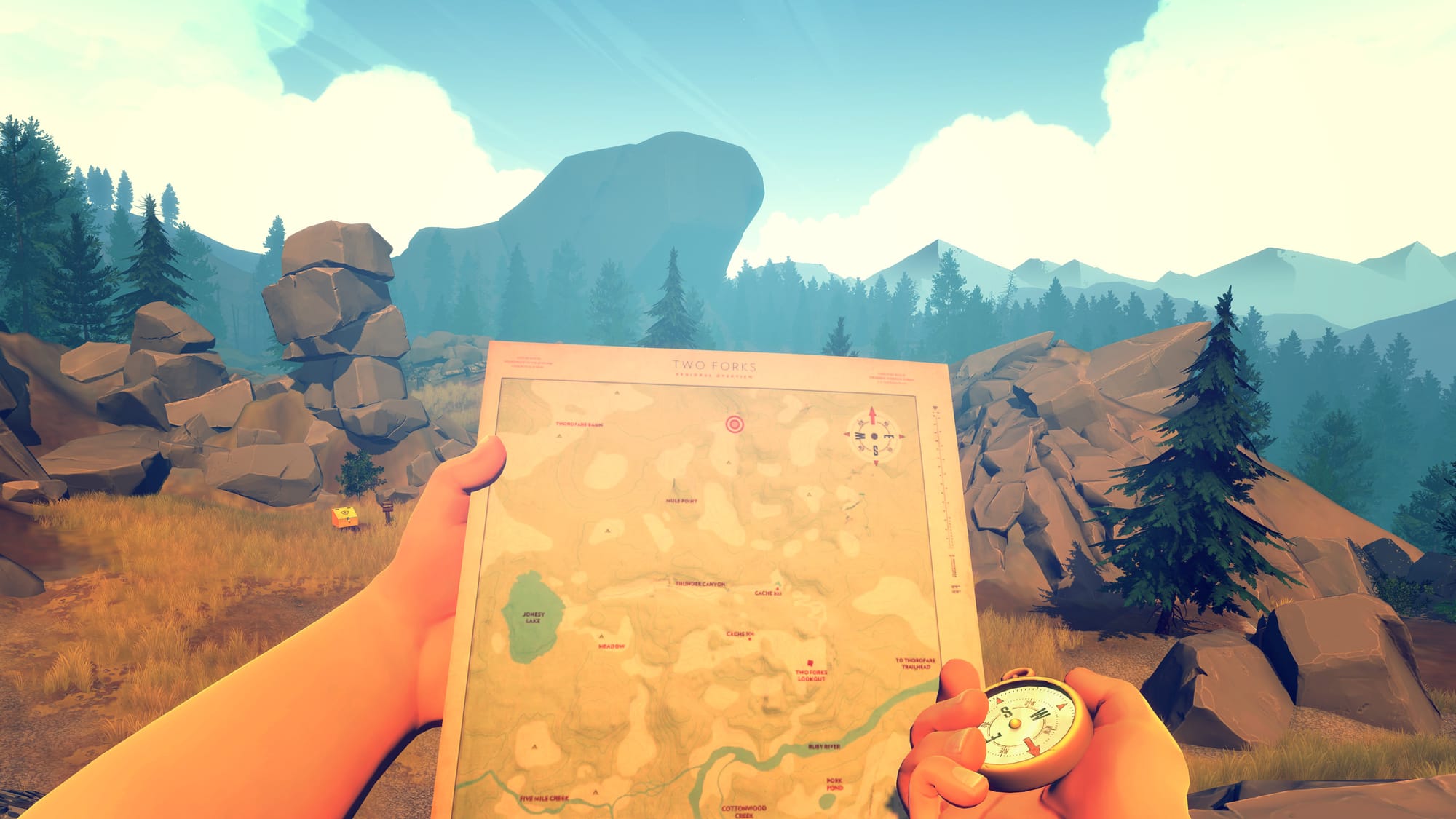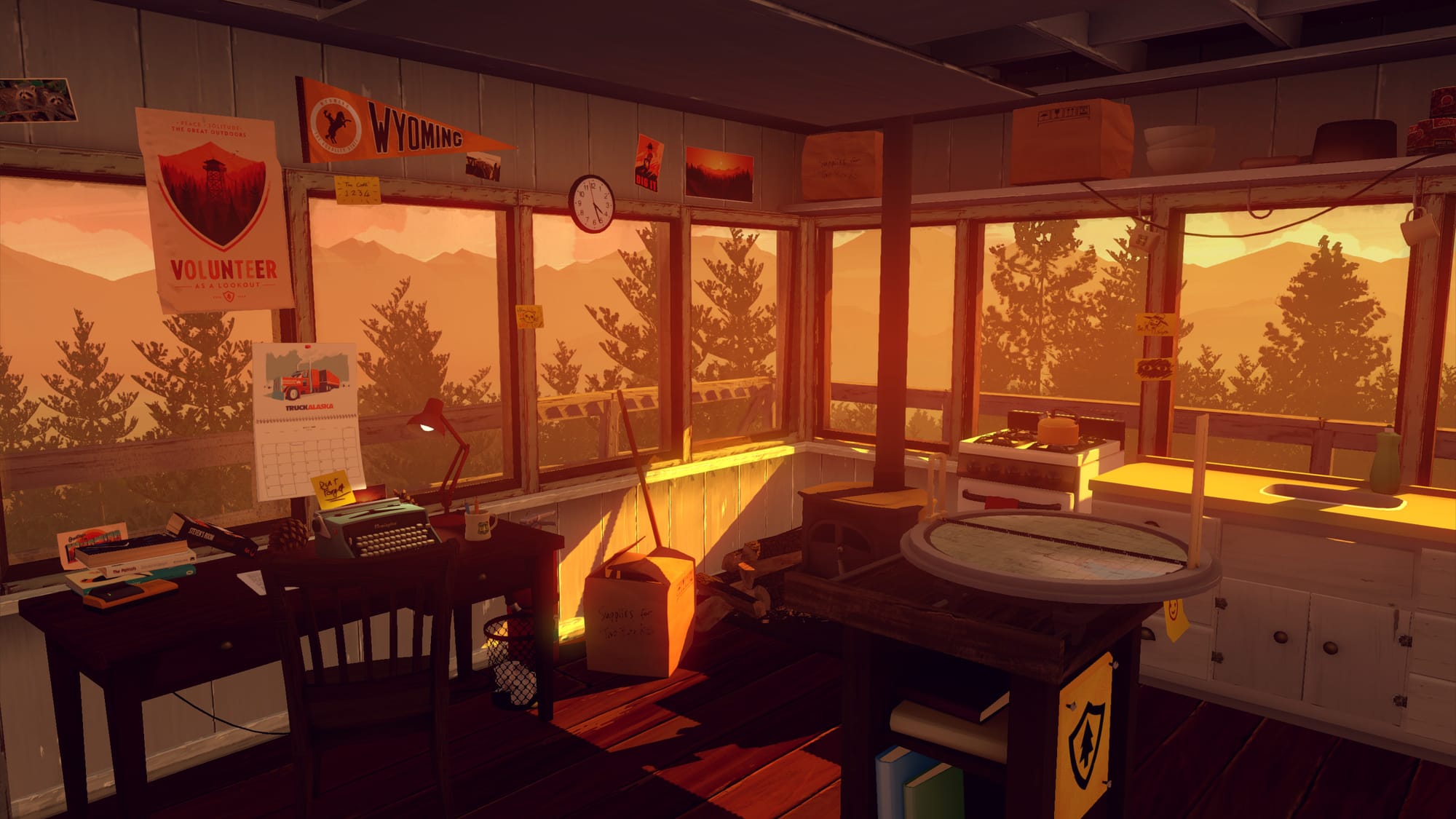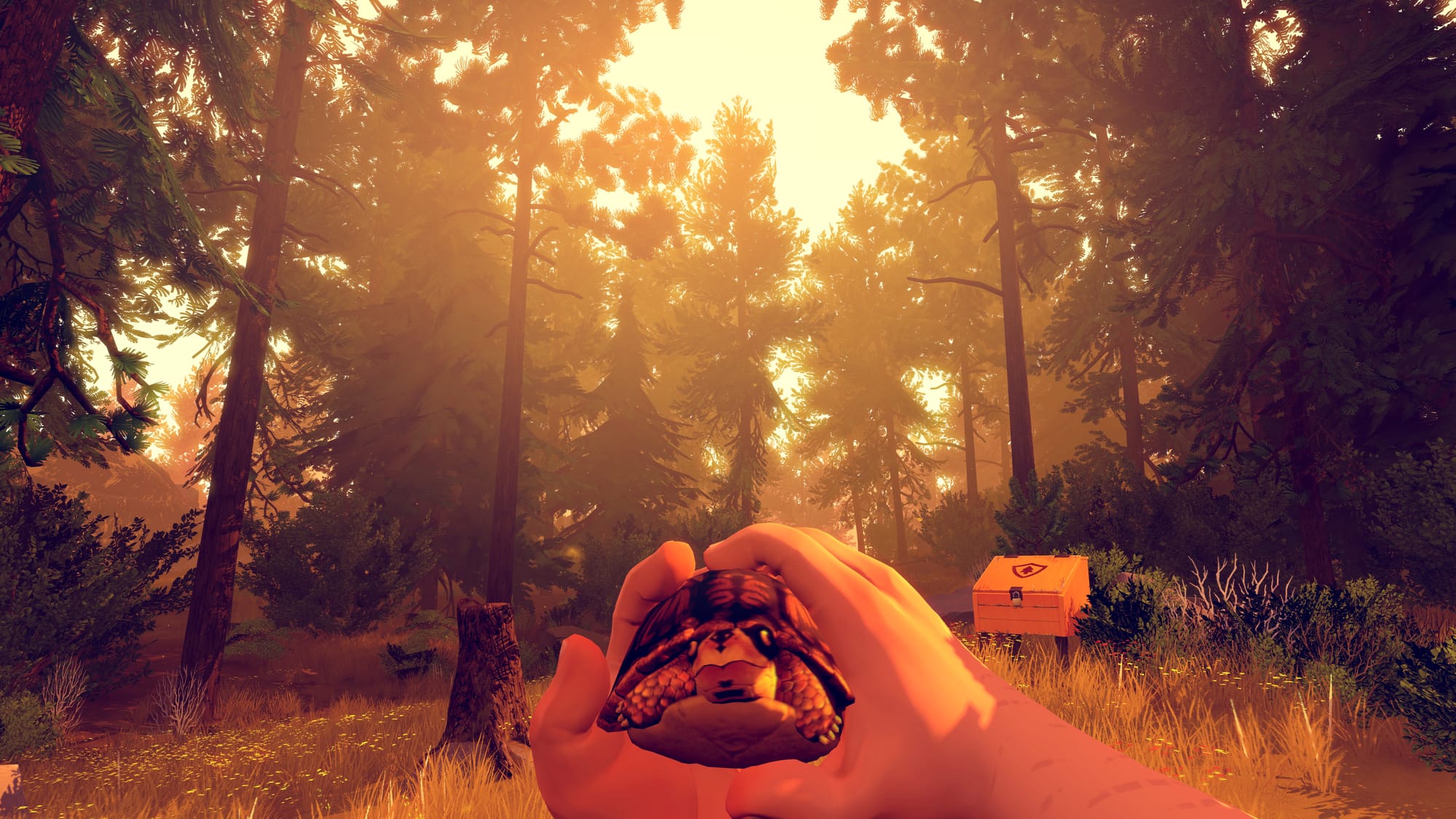Firewatch: Looking For Ludo-Narrative Harmony
This game, like many others featured on this blog, has lingered in my mind long after I first played it. It unquestionably remains one of the most impactful gaming experiences I've had in years. In this brief article, I aim to elucidate why 'Firewatch' stands as a remarkable example of interactive storytelling, and why it deserves a place in your collection.
Minimalist And Impactful Storytelling
In the expansive and varied world of video games, "Firewatch" stands out as an exemplar of storytelling and indie development prowess. Crafted by the talented minds at Campo Santo, this game seamlessly combines interactive storytelling with immersive gameplay, all to serve a single purpose: to recount the unusual and captivating story of Henry during his seasonal role as a fire ranger in the summer of '89.
Amidst challenging circumstances impacting his partner, Julia, Henry teeters on the edge of a mental breakdown. Seeking distance from the harsh realities affecting his relationship, he seizes the opportunity for a seasonal job as a rookie fire ranger in a Wyoming natural reserve—a contract spanning 80 days that, in theory, should provide the much-needed respite he yearns for, allowing him to "see things through" from a distance.
As Henry steps into this realm of natural beauty, Delilah, his supervisor, extends a warm welcome over the radio waves of his walkie-talkie. Shortly enough, she becomes his connection to the outside world, and humanity as a whole for the next two and a half months. This mode of communication becomes the sole and, consequently, most vital emotional connection as the story unfolds.
Henry's initial days are not without challenges. He swiftly encounters a series of events hinting at the presence of an unknown figure harassing a group of teenagers and witness breaking his watchtower. Yet, uncertainty shrouds these occurrences—Who was the person these kids described? Was the wrecking of the tower an isolated act of jevenile vadalism? At this stage, nothing is certain. Other voices are heard over the radio, but Delilah appears oblivious to them. The telecom line is severed, and Henry is knocked unconscious while pursuing the static sound of a lost radio deep in the forest. Was it an ambush? Cut to black, and I won't reveal more.
The mysteries of Two Forks Woods propel Henry on an unexpected journey, leading him and Delilah to question their safety and sanity. What unfolds can only be described as a thriller with undertones of horror, evoking shades of influence from Stephen King. However, the true brilliance of the game, in my view, lies not in these aspects but in the profound acknowledgment that Henry is the story, and you are Henry.

Character Arc and Emotional Resonance
As the game progresses, the players is offered the opportunity to gradually peel back the layers of Henry and Delilah's intricate personalities, their hypothetical romantic involvement, and their influence and stances when faced with adversity. Without delving into spoilers, Henry's character arc is closely tied to his decision to leave his life behind - at least for a short while.
Indeed, Henry's character is driven by a strong desire to escape the challenges of real life momentarily, to seek solace and distraction in a beautiful and mesmerizing lanscape. Thus, he chooses to become a rookie fire ranger for a short time—a necessary and temporary escape to satisfy his need for fresh air.
In many ways, the player is Henry—not in the conventional player-avatar sense, but as entities sharing a similar core motivation. You, too, are taking a break from your life to find solace in a beautiful, isolated world when playing 'Firewatch'. You seek a sense of escapism when playing the game, and will enjoy this experience whilst being socially disconneted. This thin layer of dissociation between player and character contributes significantly to the game's relatedness and the emotional impact of the story. This nearing overlap proves both challenging and delightful to navigate as the story unfolds and stakes rise. To me, this is what makes 'Firewatch' exceptionally unique.

Player's Agency and Narrative Editorial
"Firewatch" adopts an open-world walking-simulator format segmented into chapters. While players have a wealth of options and the freedom to explore the world or respond to their supervisor as they see fit, the game maintains a linear narrative experience. Gameplay periodically leaps forward in time, placing Henry in different moments on the story's timeline.
The initial abrup cut might surprise the player, as if the game asserts editorial authority over their experience or agency. But it serves a very practical function - to keep the pace of the story, control rise of tention, and to induce the questioning of Henry's state of mind prompting the questions - How is he coping? Where is he emotionally? What urgency and priorities does he now face?
As chapters consume the 80-day currency of Henry's contract timeline, the player become aware that they are inching closer to a particular form of conclusion as the days nearing the end of the summer. This is a brilliant narrative tool, foreshadowing the unexpected resolution of the story and delivering it through a simle, yet effecient narrative device. While the final chapter might be misunderstood or underated by some, I found it to be a masterstroke. It leaves you in an unexpected state of contemplation, realizing that a part of you will forever reside in Two Forks Woods.

Impact and Legacy
Since its release, "Firewatch" has earned acclaim for its narrative innovation. It has sparked discussions in numerous gaming forums and podcasts, celebrated for its achievements and bold departure from conventional gaming formulas. It's a unique gem brought to life by an indie studio blessed with skilled storytellers, game developers, and talented actors. The scale and delivery of 'Firewatch' were perfectly suited for a debut indie game, solidifying its creators' legacy in an impressive manner.
A bonus mode is offered to players who have completed the game, allowing them to revisit 'Firewatch' locations with a set of audio tapes. Collecting these tapes unlocks commentaries from the director and the development team behind this masterpiece—an insightful experience to savor while traversing the breathtaking natural beauty of the game's setting.

Conclusion
The emotional depth and resonance of 'Firewatch' are undeniably remarkable and will leave an indelible mark on your soul. It is far from a conventional hero's journey, a leveling-up experience with epic boss fights, or a grand treasure hunt—it is a philosophical tale all its own. The quality of writing and interpretation can only be compared to titles like 'The Last of Us' or 'Stray,' introducing humanity to places mostly devoid of it. Needless to say, 'Firewatch' has haunted me for all the right reasons since I first played it. It's a unique experience you must encounter for yourself.
Game and Photo Credits: ©2024 Campo Santo, in cooperation with Panic. Firewatch is a trademark of Campo Santo. Website: https://www.firewatchgame.com
Firewatch is available on Windows, Mac, and Linux via Steam, as well as Nintendo Switch via the Nintendo Store, PlayStation 4 via PlayStation Store, and Xbox One via the Microsoft Store.
#firewatch #storytelling #agency #characterarc #narrativeeditorial #emotionalresonance
